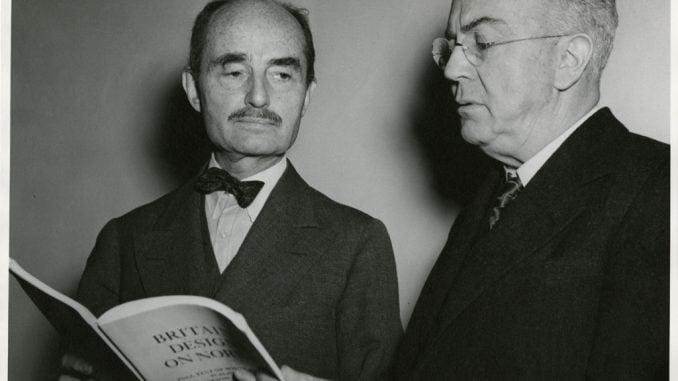
On April 10, Justice Anthony Kennedy swore in Judge Neil Gorsuch as the 113th Justice of the United States the Supreme Court. The solemnity of that moment contrasted sharply with the weeks of tumult preceding it. Several colleagues have asked me whether, and when, a North Carolinian served or was nominated for service on the Supreme Court. John J. Parker is North Carolina’s last citizen nominated to the Supreme Court, 87 years ago.The Senate vote against his nomination leaves North Carolina without a son or daughter on the highest court since John Adams nominated, and the Senate confirmed, Alfred Moore in 1800. Moore succeeded the only other North Carolinian to serve on the court, James Iredell, whom George Washington selected for the first Supreme Court in 1790.John J. Parker was a native of Monroe, born in 1885. He was the son of John Daniel Parker, an independent grocer, and Frances Ann Johnston, the well-educated descendant of a line of early North Carolina governors, as well as Justice Iredell. Parker worked his way through the University of North Carolina at Chapel Hill, where he graduated in 1907, securing many academic honors. In 1908, he earned his law degree at UNC through a one year post-graduate course. Although the son of Democratic parents, Parker joined the Republican Party after college, beginning a quick ascent in North Carolina’s legal ranks. He earned a reputation for excellent oratory skills, as well devotion to the painstaking study of the law.In post-reconstruction North Carolina, Parker sought to represent the state’s emerging industrial interests. At age 25, he became a GOP congressional candidate, received a state attorney generalship nomination six years later, and in 1920 became the party’s gubernatorial candidate.Parker lost all three campaigns, however, and turned his eyes to a career on the bench. In 1925, President Calvin Coolidge appointed Parker to the U.S. Court of Appeals for the Fourth Circuit, and he won Senate confirmation without controversy. Parker developed a reputation as a workhorse, writing 184 opinions from 1925-1930. President Herbert Hoover nominated him to the Supreme Court in 1930. At 44, Parker was one of the youngest Supreme Court nominees in history.The initial reaction to Parker’s selection was widespread acclaim. By choosing a Republican of Parker’s standing, President Hoover received praise for rewarding the developing Republican Party in the South. Swift confirmation seemed likely. Despite the early momentum, a grassroots effort entered the scene to stop him. For the first time in American history, organized labor (led by the American Federation of Labor) and civil rights forces (galvanized by the NAACP) built sufficient opposition to defeat a major presidential appointment.Labor unions seized on Judge Parker’s decision in United Mine Workers of America v. Red Jacket Consolidated Coal Co., where he upheld “yellow-dog contracts” enforcing an employee’s promise not to join a union while employed. Parker’s supporters maintained that his opinion followed Supreme Court precedent.The NAACP opposed Parker because of remarks he made in response to charges that his party was mobilizing the African-American vote during his 1920 gubernatorial campaign. Parker had distanced his party from these charges, observing that “the Republican party of North Carolina does not desire… the negro as a class to enter politics.” Although no evidence of racism had appeared in his judicial opinions, these campaign statements, combined with his perceived anti-labor opinions, were enough to sink Parker’s nomination. The Senate vote was 3941.The defeat of Parker’s nomination in 1930 was the first rejection of a Supreme Court nominee in almost 50 years. Judicial historians point to this vote as the beginning of the modern confirmation process for federal judges. The Senate’s rebuff signaled a new perception of the Supreme Court as a vehicle for social change. The paradigm central to the evaluation of Judge Parker is parallel to the paradigm that accompanies today’s nominations to the federal courts, with Supreme Court nominations obviously capturing the most attention: does the background and record of the nominee forecast judicial opinions acceptable to the social and political views of Senators and, as of the Gorsuch nomination the views of a simple Senate majority?Following the Senate vote, Parker resumed his service on the Fourth Circuit, serving in this capacity until his death on March 17, 1958. He upheld landmark New Deal regulatory legislation and struck down racially discriminatory municipal zoning ordinances. During the Allied Tribunal in Nuremberg, Parker served as an alternate judge where he contributed to the critical “conspiracy” issue in the tribunal’s final judgment. A leading feature of Parker’s legacy is his forceful advocacy for maintaining the independence of the judiciary, a principle securing heightened attention today.In 1959, the North Carolina Bar Association established an award in Judge Parker’s memory and honor “to encourage the emulation of his deep devotion and enduring contribution to the law and the administration of justice.” The John J. Parker Award is the highest honor the association bestows.John Wester is a lawyer with Robinson Bradshaw in Charlotte and a past president of the N.C. Bar Association.




